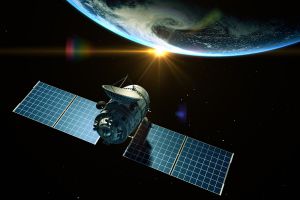What Is… A Payload?
What is a Payload?
 A payload is a term used to describe the portion of a spacecraft or rocket that is responsible for achieving the mission’s primary objectives. Payloads can be scientific instruments, communication equipment, or any other specialized equipment that is needed for the mission.
A payload is a term used to describe the portion of a spacecraft or rocket that is responsible for achieving the mission’s primary objectives. Payloads can be scientific instruments, communication equipment, or any other specialized equipment that is needed for the mission.
Payloads are an essential part of space exploration. They have contributed significantly to our understanding of the universe and allow us to explore the universe in ways that were previously impossible. Payloads have allowed us to study the characteristics of other planets, measure the properties of distant galaxies, and even search for signs of life beyond Earth.
What Are Payloads Used For?
One of the primary benefits of payloads is that they allow us to collect data and perform experiments in environments that are otherwise inaccessible to humans. By sending payloads into space, we can learn about other celestial bodies and the conditions that exist in the vacuum of space.
Payloads can be classified into several different categories, depending on their intended use and the specific requirements of the mission. Some common types of payloads include:
- Scientific payloads: These payloads are designed to collect data and perform experiments in order to increase our understanding of the universe. Examples include telescopes, spectrometers, and other instruments used to study celestial bodies and phenomena.
- Communication payloads: These payloads are used to establish and maintain communication links between Earth and spacecraft or between spacecraft and other celestial bodies. Examples include radio antennas, modems, and transponders.
- Navigation payloads: These payloads are used to determine the position and orientation of a spacecraft or other object. Examples include star trackers, gyroscopes, and accelerometers.
- Observation payloads: These payloads are used to gather imagery and other data about the surface of celestial bodies or other objects of interest. Examples include cameras, radar, and lidar.
- Human support payloads: These payloads are designed to support the needs of humans in space, such as providing life support, thermal control, and waste management.
- Cargo payloads: These payloads are used to transport supplies and equipment to the ISS or other space missions. This can include food, water, and spare parts for the spacecraft or scientific instruments.
 In addition to their scientific applications, payloads have also been used for a variety of practical purposes. Communication satellites, for example, are used to provide a vital link for global communication and entertainment. These satellites are used for television, radio, and internet communications, and play a crucial role in our daily lives. Weather satellites are another type of payload that has had a significant impact on humanity. These satellites are used to monitor and predict weather patterns around the world, which has helped to improve the accuracy of weather forecasts and enabled us to better prepare for extreme weather events. Learn more about the ways satellites benefit humanity in What is… a Satellite?
In addition to their scientific applications, payloads have also been used for a variety of practical purposes. Communication satellites, for example, are used to provide a vital link for global communication and entertainment. These satellites are used for television, radio, and internet communications, and play a crucial role in our daily lives. Weather satellites are another type of payload that has had a significant impact on humanity. These satellites are used to monitor and predict weather patterns around the world, which has helped to improve the accuracy of weather forecasts and enabled us to better prepare for extreme weather events. Learn more about the ways satellites benefit humanity in What is… a Satellite?
On top of their direct benefits, payloads have also helped to drive technological innovation and economic growth. The development and deployment of payloads requires advanced technologies and expertise, which has contributed to the growth of many industries and has created jobs for skilled workers. The development, manufacture, and operation of payloads require a wide range of skilled workers, including engineers, technicians, and scientists.
Another way that payloads have contributed to technological innovation is by enabling the testing of new technologies in the space environment. The space environment provides unique challenges that cannot be easily replicated on Earth, such as extreme temperatures, radiation, and microgravity. By testing technologies in space, we are able to determine their capabilities and limitations, and make necessary improvements. This has led to the development of new technologies such as advanced materials, propulsion systems, and communication systems, which have had numerous applications on Earth.
Payloads has proven to be a valuable and essential tool for exploring and understanding the universe. As we continue to push the boundaries of space exploration and seek to answer some of the most fundamental questions about the universe, payloads will continue to play a vital role in advancing our knowledge and understanding of our world and the wider universe.
Image Credit: NASA via Picryl.com